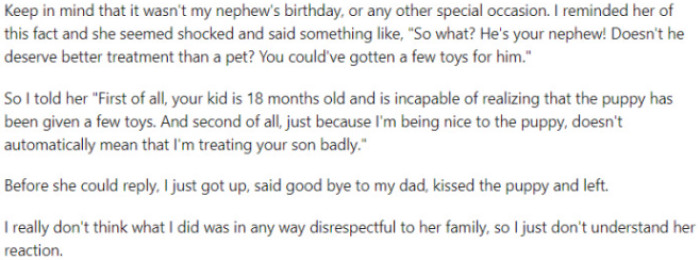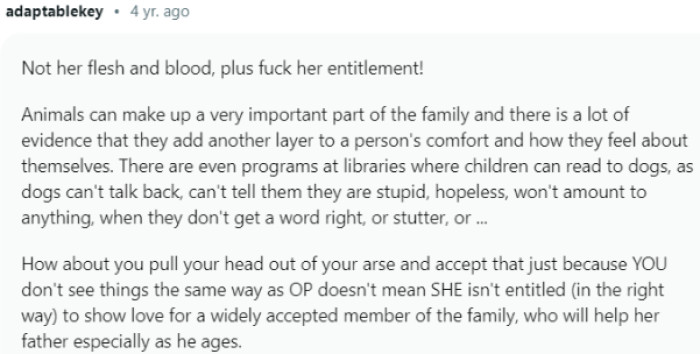Redditor Wants To Know Whether It Is Disrespectful To Buy Presents For A Puppy But Not For An 18 M.O. Baby
Pets have always been a significant part of human life, and the bond between them and their owners is undeniably strong. For many pet owners, their pets are not just animals but also part of their family, and they are willing to do anything to take care of them.
However, this attitude often creates conflicts and debates, especially when it comes to children. Some people argue that prioritizing pets over children is disrespectful, while others think it is justifiable. This is a grey area, and we have one of those stories today. Let's go through it together.
OP recently lost their dad's dog, which was like a third child to him. The loss of a pet can be challenging for any pet owner, and the grief is often overwhelming.
However, a few days ago, OP's dad and stepmom adopted a puppy, which brought joy and excitement to the family. OP, being a pet lover, went over to their place with lots of gifts for the new addition.
Unfortunately, OP's sister-in-law saw all the presents for the puppy and became annoyed, claiming that it was cruel to her child that OP hadn't gotten anything for him. Read the full story below:
My dad and stepmom adopted a puppy

My SIL gave me a really annoyed look

Some people expect presents for their kids every time

The Psychology of Gifts and Value
Dr. Laura Chen, a developmental psychologist, explains that gift-giving is often tied to perceived value and attachment.
This dynamic can lead to feelings of jealousy or resentment when individuals feel that one recipient is favored over another.
Research shows that children learn these values early on and carry them into adulthood, influencing their relationships with both people and pets.
The Social Dynamics of Gift-Giving
Gift-giving is often laden with social expectations and cultural norms. Research in social psychology indicates that gift-giving can reflect the giver's values and relationships, often serving as a means of expressing affection or social obligation.
In this case, the disparity in gift-giving between a pet and a child may indicate deeper issues related to familial bonds and perceived value within relationships. According to studies published in the Journal of Social Issues, such dynamics can lead to feelings of favoritism or neglect among family members.
Your SIL is jealous of a cute puppy

Mom of young kids' opinion

Hope your brother will do something

A social psychologist at Harvard University notes that societal norms often dictate how we perceive the importance of gifts based on age and role within the family.
These norms can create pressure to conform to certain standards, often leading to conflict when expectations are not met.
Studies indicate that understanding these social pressures can help mitigate feelings of resentment.
Furthermore, children's needs can sometimes be overshadowed by adults' perceptions of what is 'worthy' of celebration or recognition. Research shows that when children feel less valued than pets or possessions, it can significantly impact their self-esteem and sense of belonging within the family unit.
According to a study from the American Psychological Association, early experiences of neglect can lead to difficulties in emotional regulation and interpersonal relationships later in life.
Some people are insane

It makes your SIL look bad and ignorant

She is selfish

Understanding Perceptions of Value
Value is often subjective and can vary widely among individuals.
According to research in psychological science, what one person values highly may not hold the same significance for another.
Encouraging family members to communicate their feelings about gift-giving can foster understanding and reduce conflict.
Developing a Balanced Perspective on Gift-Giving
To foster a balanced perspective on gift-giving, it’s essential to prioritize the emotional needs of all family members. Effective communication is key in expressing feelings about perceived imbalances in attention and recognition.
Utilizing “I” statements to articulate feelings can help clarify intentions and foster understanding, as research shows that open dialogue can reduce misunderstandings and resentment.
This scenario depicts how some people may perceive the act of prioritizing pets over children as a sign of disrespect. However, OP tried to explain that it was not a special occasion, and her child wouldn't even realize that the puppy had received presents.
It is essential to understand that different people have different opinions on what is considered respectful and disrespectful behavior towards their children, pets, and other family members. Therefore, communication and understanding each other's perspectives are crucial to avoiding conflicts and maintaining healthy relationships.
While pets are a significant part of many people's lives, it is crucial to balance their needs with those of other family members and their opinions.
Kids should learn that no one owes them anything and life is seemingly unfair sometimes

You did nothing wrong

She is such an idiot

Practical suggestions include establishing guidelines for gift-giving that consider all family members' feelings.
Creating a family tradition that honors both pets and children can help prevent feelings of favoritism.
Research suggests that shared experiences and celebrations can strengthen family bonds and reduce jealousy.
Moreover, educating family members about the importance of valuing all relationships—whether with pets or people—can promote a more inclusive family culture. Workshops or discussions focused on emotional intelligence can help families navigate these complex dynamics, fostering empathy and understanding among members.
According to studies in developmental psychology, teaching children about emotional connections can enhance their social skills and emotional awareness, leading to healthier relationships.
Animals can make up a very important part of the family

Different people have different opinions on what is considered respectful or disrespectful behavior towards their children and pets. In a recent scenario, the Redditor's sister-in-law perceived their actions towards a puppy as disrespectful to her child.
However, the Redditor did not agree. Communication and understanding each other's perspectives are crucial to avoiding conflicts and maintaining healthy relationships.
It is essential to acknowledge that pets are considered family members by some, and it is important to respect each other's opinions, even if they differ from our own. By doing so, conflicts can be resolved respectfully and productively.
The Role of Therapeutic Interventions
In cases where perceptions of favoritism or neglect become entrenched, family therapy can be an effective intervention. Research indicates that family therapy can help address underlying issues, improve communication, and promote empathy among family members.
Therapists can guide families in exploring their dynamics, helping them recognize patterns that may contribute to feelings of neglect or unworthiness.
Psychological Analysis
This situation reveals the complexities of familial relationships and the perceptions of value within them. Often, children may feel overlooked in favor of pets or other interests, which can lead to feelings of inadequacy. As a psychologist, I encourage families to reflect on their values and ensure that all members feel valued and acknowledged.
Analysis generated by AI
Analysis & Alternative Approaches
Understanding the social dynamics of gift-giving can help families navigate feelings of favoritism and neglect. By prioritizing communication and emotional needs, families can foster healthier relationships. Therapeutic interventions may provide the support needed to address underlying issues and promote empathy and understanding among family members.
The Impact of Comparison on Relationships
Comparison can be detrimental to relationships, often leading to feelings of inadequacy.
Studies show that individuals who frequently compare themselves to others experience higher levels of anxiety and lower self-esteem.
This pattern can create tension within families, particularly when perceived favoritism is involved.
Psychological Analysis
This situation highlights how perceptions of value can lead to conflict within family dynamics.
Addressing these feelings openly can help families navigate their relationships more effectively.
Analysis generated by AI
Analysis & Alternative Approaches
Ultimately, understanding the psychological factors at play in gift-giving can enhance familial relationships.
Encouraging open communication about feelings and expectations can lead to more equitable dynamics.
By fostering a culture of appreciation for both pets and children, families can create stronger bonds and reduce feelings of resentment.



